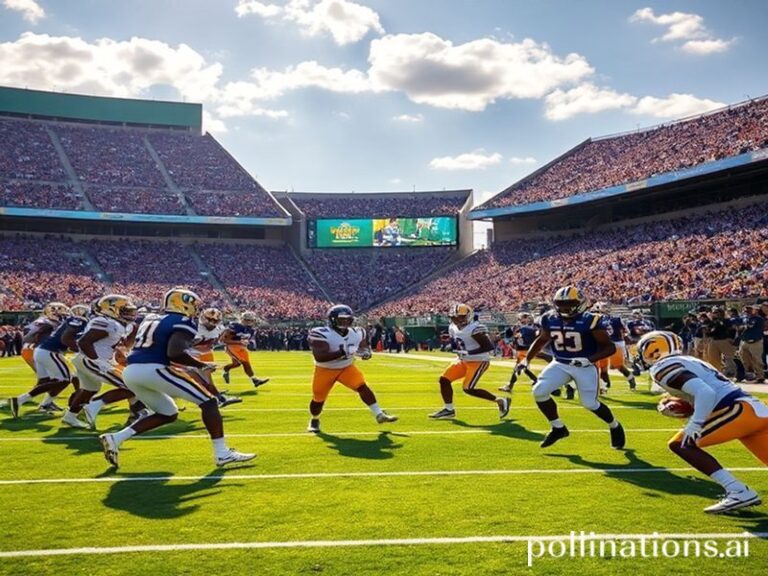Kate Beckinsale: Britain’s Accidental Global Superpower in Leather and Irony
Across the planet—whether you’re sipping cortado in Madrid, slurping borscht in Minsk, or pretending to enjoy oat-milk flat whites in Los Angeles—one truth unites us: somewhere, a screen is playing Kate Beckinsale in slow-motion, hair billowing like a UN flag for our collective existential dread. The British actress, once a polite Oxford ingenue, has become an accidental diplomat of late-capitalist glamour: armed with thigh-high boots, a rapier wit (literal and figurative), and Instagram captions sharp enough to trigger NATO sanctions.
In an age when nation-states outsource soft power to Netflix and Disney+, Beckinsale is the rare cultural export that keeps both Foggy Bottom and the Kremlin guessing. Washington leaks memos fretting that her viral clapbacks erode the dignity of Anglo-American relations; Moscow’s bots test algorithms by reposting her cat videos to sow confusion. Somewhere in Beijing, a mid-level censor sighs, hits “approve,” and wonders why an Englishwoman mocking her own dental work feels subversive. The answer, dear reader, is that irony no longer requires translation.
Consider the geopolitical ripple effects of Underworld (2003-present). What began as a vampiric fashion show shot in Budapest—cheap labor, gothic architecture, post-Communist ennui—accidentally mapped the EU’s eastward expansion. Each sequel’s budget ballooned like Greek debt, dragging tax credits from Prague to Cape Town, turning Beckinsale into a peripatetic stimulus package. When she somersaults in patent leather, economists in emerging markets quietly high-five: tourism boards slap her silhouette on tram ads, and local stunt coordinators finally fix that slipped disc. Globalization, like lycanthropy, is mostly about who gets bitten.
Off-screen, the actress operates as a one-woman sanctions regime against male mediocrity. From red-carpet interviews to late-night couches, she weaponizes posh sarcasm against Hollywood’s anodyne machismo. Italian journalists adore her because she flirts in fluent Dante; Japanese variety shows book her to gasp politely at squid jerky; German hosts just want confirmation that British teeth remain an international tragedy. She obliges, collects another stamp in the diplomatic passport of fame, and flies private to the next junket—carbon offsets sold separately.
Meanwhile, her Instagram is a rogue state: a glitter-dusted DMZ where followers witness botox confessions next to tributes to dead Persian cats. The algorithm, unsure whether to flag or promote, simply boosts everything, creating a soft-power Chernobyl of influencer fallout. Teenagers in Jakarta quote her puns; pensioners in Leeds tut-tut; somewhere an AI in Silicon Valley achieves sentience just to ask, “Is this performance art or midlife crisis?” The correct answer, per Beckinsale, is “yes, darling.”
Yet beneath the snark lies an elegy for the nation-state of celebrity itself. Once, stars were monoliths projected onto the global imagination; now they’re niche micro-nations issuing currency in the form of merch drops. Beckinsale’s currency trades high—see the $3,000 trench coats she unboxes with the ennui of a war criminal tallying reparations—but volatility looms. Tomorrow’s meme could sink her Q rating faster than you can say “Brexit.” Still, she persists, a Remain voter in a body-con dress, negotiating brand extensions like peace treaties.
In the end, Kate Beckinsale matters because she embodies our schizophrenic century: equal parts Shakespearean pedigree and TMZ fever dream, fighting fictional werewolves while real ones circle parliaments. She reminds us that fame is now less a crown than a timeshare in Dubai—luxurious, fleeting, and probably built on sand. So let the world keep spinning its grim carousel of trade wars, supply-chain snarls, and whatever Elon tweets at 3 a.m. Somewhere, Beckinsale is filming slow-motion gun-fu in a Budapest warehouse, and for two commercial-free hours we all speak the same language: beautiful, absurd, and slightly homicidal.







